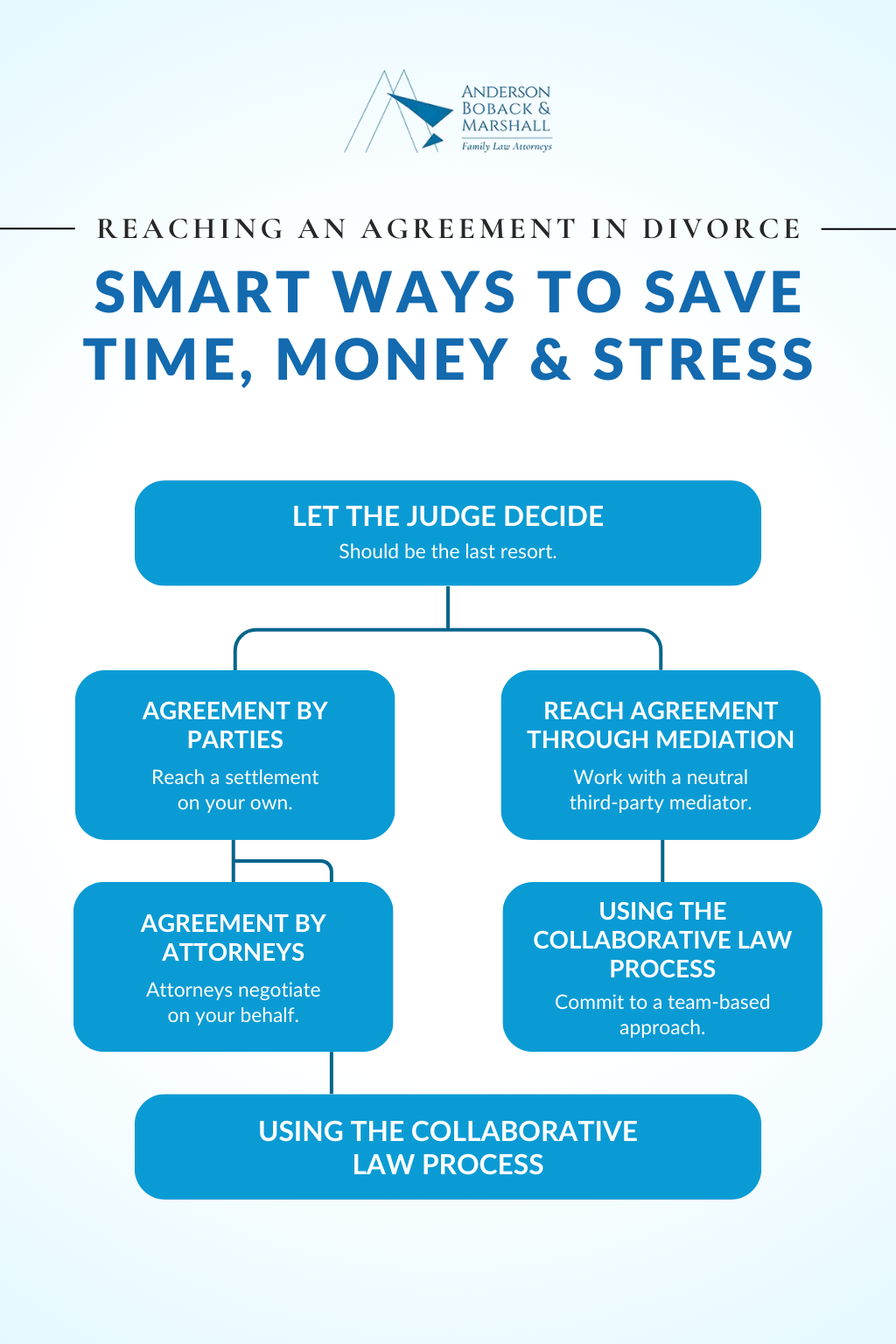If you’re going through a divorce in Illinois, reaching an agreement with your spouse instead of heading straight into a courtroom battle can save you time, money, and stress. It also helps you stay in control of key decisions such as parenting time, finances, and your future.
At Anderson Boback & Marshall, we help clients explore resolution strategies that save time and money while protecting their long-term goals.
In this post, you’ll learn practical ways to settle your divorce, protect what matters most, and avoid the emotional and financial toll of going to court.
Let the Judge Decide: Why It Should Be the Last Resort
Letting a judge decide major life issues like parenting time or finances often means giving up control. When a case goes to trial, you give up control over issues like parenting time, asset division, and spousal support. Litigation also tends to be costly, time-consuming, and emotionally exhausting. While some high-conflict or safety-related cases must go before a judge, most divorces are better resolved outside the courtroom.
Tips for Reaching an Agreement in Your Divorce
Reaching a divorce agreement in Illinois does not mean giving up what matters to you. It means taking a strategic, informed approach to compromise. There are several methods you can use depending on your situation. The right path depends on how complex your finances are, how well you and your spouse can communicate, and whether children are involved.
Agreement by Parties
If you and your spouse are able to communicate respectfully and agree on major issues, you may be able to reach a settlement without legal intervention. This approach works best when there is limited conflict, no complex financial matters, and a shared commitment to fairness.
Agreement by Attorneys
Even if direct communication with your spouse is difficult, your attorneys can negotiate on your behalf. This method introduces professionalism and removes the emotional volatility that can derail productive talks. At Anderson Boback & Marshall, our attorneys are skilled in guiding these negotiations toward favorable, efficient outcomes.
Reach Agreement Through Mediation
Mediation involves a neutral third-party mediator who helps both spouses work toward a voluntary agreement. It is often faster, less expensive, and less adversarial than litigation.
Mediation Through Cook County
In Cook County, court-connected mediation is often required for custody disputes. It is typically free but may be limited to parenting issues. While this option can be helpful, it may involve scheduling delays and fewer options for addressing financial matters.
Private Mediation
Private mediation allows you to select a mediator and address a broader range of issues, including finances and support. It is more flexible and timely than court-connected mediation. Although there is a cost involved, it is usually far less than the expense of a full trial.
Using the Collaborative Law Process
Collaborative divorce is a structured, team-based approach in which each spouse has a specially trained attorney, and both commit not to go to court. Financial and mental health professionals may also be involved. This process is ideal for high-net-worth individuals or those concerned about preserving privacy, minimizing conflict, and reaching creative, mutually beneficial solutions.
Our attorneys are trained in collaborative divorce and regularly work with professionals to create custom solutions that protect our clients’ privacy and long-term goals.
Protect your privacy and consult with a collaborative divorce attorney
How Do You Save Time and Money in a Divorce?
Saving time and money during divorce starts with choosing the right path. Litigation is typically the most expensive and drawn-out method. By choosing mediation, collaborative law, or attorney negotiation, you retain more control over costs and timelines. You can also:
- Get organized early by gathering financial documents and parenting schedules
- Focus on big-picture goals instead of minor disputes
- Avoid emotional decision-making by leaning on your legal team for strategy
- Be prepared to compromise when it protects your priorities
How to Work Towards a Divorce Settlement
Settlement is a process, not a single conversation. Start by identifying your top priorities: children, home, retirement savings. Understand what you are willing to give up and what is non-negotiable. Consider using professionals such as financial advisors or therapists to support the process. Finally, put everything in writing and have your attorney review it thoroughly before signing any agreement.
Tips to Help You Work Towards Settlement
- Break negotiations into smaller topics (e.g., parenting, property, support)
- Take breaks when emotions run high
- Use neutral communication platforms or mediators if needed
- Keep your children out of the conflict
- Think long-term: the cost of ongoing litigation often outweighs early compromise
Compare Divorce Resolution Paths
| Method | Timeframe | Control | Emotional Strain |
| Judge Decides (Trial) | 12 to 18 months | Very Low | Very High |
| Agreement by Parties | 2 to 3 months | Very High | Medium |
| Attorney Negotiation | 4 to 6 months | Medium–High | Moderate |
| Court Mediation (Cook) | 3 to 6 months | Moderate | Low |
| Private Mediation | 2 to 4 months | High | Low |
| Collaborative Divorce | 3 to 6 months | Very High | Very Low |
Anderson Boback & Marshall: Your Divorce Resolution Team
At Anderson Boback & Marshall, we help clients navigate every step of the divorce agreement process. Whether through negotiation, mediation, or collaboration, our attorneys bring clarity, strategy, and compassion to even the most complex situations. We serve clients throughout Cook, Lake, DuPage, and Will Counties.
FAQs: Common Questions About Reaching Divorce Agreements in Illinois
What is the fastest way to reach a divorce agreement in Illinois?
Private mediation or attorney negotiation is often the quickest path, depending on your case and communication dynamics.
How is collaborative divorce different from mediation?
Collaborative divorce uses a structured team approach, including attorneys, financial professionals, and therapists, all working together with a no-litigation commitment. Mediation typically involves only one neutral mediator without legal representation during the sessions.
Can I reach an agreement without going to court?
Yes, most Illinois divorces are resolved through out-of-court settlements, either via mediation, collaboration, or attorney-led negotiation.
What if my spouse refuses to settle?
If your spouse refuses to negotiate in good faith, the court process may become necessary. However, an experienced legal team like Anderson Boback & Marshall can still attempt mediation or motion practice to facilitate resolution.
When should I consider hiring a mediator or collaborative team?
Early in the process if you are seeking privacy, efficiency, and a non-adversarial resolution—especially if children or significant assets are involved.
Can reaching an agreement affect custody or financial support decisions?
Yes. Reaching an agreement allows you to shape parenting and financial decisions in a way that reflects your family’s needs—rather than leaving it to a judge who doesn’t know your situation.
Begin Your Divorce Agreement Strategy with Anderson Boback & Marshall
If you are contemplating divorce or are already in the process, taking a proactive approach can help you achieve a resolution that protects your family, finances, and future. The earlier you begin exploring settlement options, the more likely you are to avoid the stress, cost, and unpredictability of litigation.
Start by evaluating your priorities and considering which path negotiation, mediation, or collaborative law suits your situation. Think about what outcomes matter most to you and where you may be willing to compromise. Preparation and clarity will put you in the best position to make informed decisions.
The attorneys at Anderson Boback & Marshall are here to help. We offer compassionate, experienced guidance tailored to your unique circumstances. Whether you are dealing with complex assets, high-conflict custody issues, or simply want to move forward quickly and privately, we are ready to advocate for your best outcome.
















